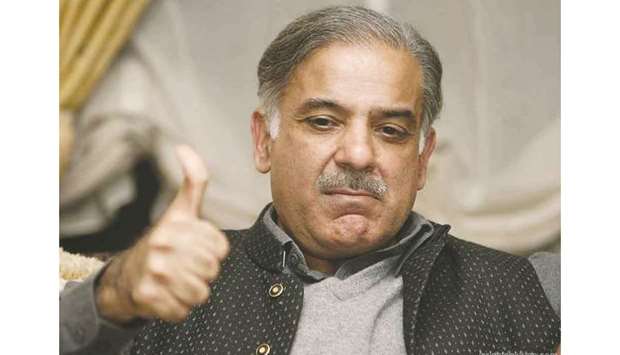The federal government led by Prime Minister Imran Khan has conceded the chairmanship of Public Accounts Committee (PAC) to Opposition Leader Shehbaz Sharif, almost three months after a stalemate over the key position.
The PAC is considered to be the most powerful and important committee of the Parliament.
The government had long stuck to its stance that the opposition should come up with any name other than Sharif for the chairmanship, but the opposition was of the view that past traditions of the National Assembly should be honoured.
However, the breakthrough came after Federal Minister for Defence Pervaiz Khattak and Minister of State for Parliamentary Affairs Ali Mohamed Khan met with Sharif in his chambers earlier yesterday.
Khattak confirmed the decision, saying that it was taken in the best interest to allow the House to continue functioning.
Foreign Minister Shah Mehmood Qureshi later said that the Prime Minister Khan conceded in the larger interest of democracy and parliamentary norms.
He said the government is now leaving the decision to Sharif to nominate a person of his choice, adding that should the opposition leader deems himself appropriate for the post of chairman of the powerful parliamentary committee, the government will not object to it.
Earlier, National Assembly Speaker Asad Qaiser called on the prime minister and discussed matters pertaining to legislation and constituting standing committees in the Lower House.
Qureshi and Khattak were also present at the meeting.
Addressing the National Assembly, Qureshi said that the constitution of the parliamentary committees is key for the House to function effectively.
He said the matter remained still stuck on the issue of appointment of Leader of the Opposition as chairman of the PAC.
Qureshi pointed out that Sharif is embroiled in a number of National Accountability Bureau cases, which were not filed by the government.
The foreign minister said that despite this, the government had made every effort to resolve the impasse.
Sharif said he appreciated the Pakistan Tehreek-e-Insaf (PTI) government’s gesture, saying that chairmanship of the PAC has been traditionally offered to the leader of the opposition.
He credited the prime minister for “reviewing his stance”, recognising that “the government wants to make this parliament functional as it wants to bring important legislation for the welfare of the people”.
Pakistan Muslim League – Nawaz (PML-N) leader and former National Assembly speaker Sardar Ayaz Sadiq felicitated the prime minister and termed the decision as his “most positive U-turn”.
“If he continues to take such U-turns, democracy will be strengthened,” he said.
Sadiq pointed out that PAC chairmanship would only count as one vote in the committee, in which government members would still be in majority.
On Wednesday, the Speaker Qaiser held a meeting with members of the opposition and government representatives to find a way out of the impasse. The meeting failed to reach consensus.
The meeting presided by Qaisar was attended by former NA speaker Sadiq, the PML-N’s Rana Tanveer and Rana Sanaullah Khan, and the Pakistan Peoples Party (PPP)’s Syed Naveed Qamar, while government was represented by Defence Minister Khattak, Finance Minister Asad Umar, and Minister of State for Parliamentary Affairs Mohamed Khan.
The government side had stuck to its stance that the opposition should have come up with any other name except Shehbaz Sharif for the chairmanship of the PAC, but the opposition was of the view that past traditions of the National Assembly should be honoured.
During the meeting, the record of the PAC pending audit paras was also sought, and according to data, the audit paras of the year 2016-17 were pending before the PAC, while the audit paras of financial year 2017-18 were yet not presented before the PAC.
The opposition in the meeting proposed that Opposition Leader Shehbaz Sharif will not preside over those PAC meetings in which the audit paras of the PML-N government of financial year 2016-17 and 2017-18 will come for examination, as it had been done in the past.
However, the government representatives in the meeting did not agree with the opposition, insisting that the opposition should show flexibility on this issue.
The PAC is the apex parliamentary watchdog that oversees the audit of revenue and expenditure by the government, and is considered to be the most powerful and important committee of the parliament.
Previously, the PAC comprised only members of the National Assembly, but recently members of Senate have also been made part of it.
Although there is no restriction on the government in the rules to offer the chairmanship of the PAC to opposition parties, it has been a parliamentary practice and tradition that the office is given to an opposition member to ensure transparency in financial matters.

Shehbaz Sharif: credited the prime minister for ‘reviewing his stance’.
